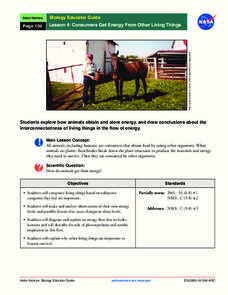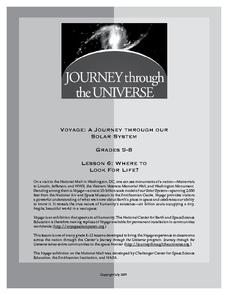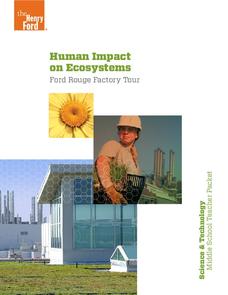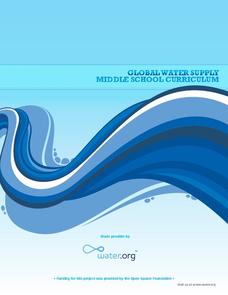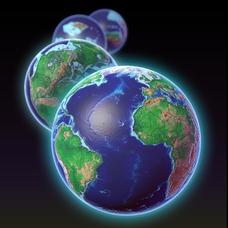New York City Department of Education
Egypt
This six-week unit encompasses all subjects with a focus study on world history and the development of ancient civilizations. As gifted and talented students dive into the interesting yet challenging topic of Egypt, they think critically...
New York City Department of Education
Learning about Lunar New Year
Rich in images and information, a teacher's guide to the traditions of Lunar New Year's celebrations in various cultures addresses celebrations of Buddhism and Daoism. It includes background information about the origins of the...
NASA
Producers Make Their Own Food
During an inquiry-based lesson, scholars decide which variable to test and then design an experiment to determine the needs of producers. After two weeks, they complete a full analysis and research paper.
Curated OER
Sustainability and Extinction
Galapagos Penguins are the only penguins on earth that live north of the equator (in the wild). In this last lesson plan a discussion on how the Galapagos islands developed their populations and diversity sparks the introduction. Two...
Curated OER
Artificial Selection
The second lesson in the series begins with a starter activity discussing wild versus domesticated animals. Then, scholars play a card game, with optional variations, to emphasize artificial selection. Next, they attend a field trip to a...
Curated OER
Darwin’s Bees
What do you call a bee born in May? A maybe! This first instructional activity in a series of four begins with a starter activity to get scholars thinking about the topic. Then a circus, or circuit of seven activities, show Darwin's...
NASA
Biology Training Conclusion
Gravity is just one consideration when determining human habitability on a new planet. The lesson connects four different units and starts with connecting the various systems: planetary systems, human body systems, etc. After scholars...
NASA
Consumers Get Energy From Other Living Things
How do plants and animals get their food? Learn about where energy comes from, how animals store energy, and aerobic respiration, in a lesson that allows scholars to diagram energy flows.
NASA
Biology Training Module
Are you a koalafied biologist? The lesson begins with research about human survival and our ecosystem. Then, an online training module simulates the effects of changes to the plants and animals in an ecosystem. Finally, scholars research...
Centers for Disease Control and Prevention
Teach Mrs. Jones' Class about Microbes
During a biology lesson, scholars research microbes, design a lesson plan using an outline, and present the lesson to the class.
Journey Through the Universe
Where to Look For Life?
Every year we discover new planets including more than 1,000 in 2016 alone. Will we ever find life on another planet? The lesson includes two activities to help scholars understand this concept. First, they analyze the temperature range...
Santa Ana Unified School District
The Giver
Wouldn't it be great to live an a community without pain, without danger? Such a society is the goal of the community in The Giver. Using Lois Lowry's dystopian novel as the core text, class members read primary source materials about...
NASA
Einstein and His Times
Scholars research and present on the historical happenings of 1919. After sharing their findings, pupils debate about how Congress dealt with the moral issues of the time. The evaluation asks learners to write a persuasive essay...
Henry Ford Museum
Human Impact on Ecosystems
An environmenta science unit includes three lessons plus a cumulative project covering the ecosystem. Scholars follow the history of the Ford Rouge Factory from its construction on wetlands and how it destroyed the environment to its...
Chemical Education Foundation
Teacher's Guide to Science Projects
Do you find the idea of having a science fair with all of your students intimidating? Use a guide that provides everything you need to know to make project-based learning manageable. The resource includes options for four different types...
Dream of a Nation
Creating Awareness through Action Oriented Writing and Research
Middle schoolers aren't too young to feel strongly about politics, social issues, consumer rights, or environmental problems. Demonstrate the first steps toward social change with a project about action-oriented writing. Eighth graders...
Water
Global Water Supply Middle School Curriculum
We take a steady shower stream and clean drinking water for granted, but in many countries around the world, the lack of water or a clean water supply is responsible for higher sickness and death rates. Taking a closer look at the water...
North Carolina State University
Exploring Genetics Across the Middle School Science and Math Curricula
Where is a geneticist's favorite place to swim? A gene pool. Young geneticists complete hands-on activities, experiments, and real-world problem solving throughout the unit. With extra focus on dominant and recessive genes, Punnett...
Curated OER
Voices from Little Rock: Understanding the Civil Rights Movement through Primary Sources
As part of a study of the Civil Rights Movement, class members examine documents associated with the Little Rock Nine, the Brown v. Board of Education ruling, the 14th and 15th Amendments to the US Constitution, and chapters from Melba...
MENSA Education & Research Foundation
Media Literacy
Young learners today are bombarded by media manipulation. Help them develop the skills they will need to become savvy 21st century media consumers with a unit on media literacy.
Dr. Seuss Enterprises
Dr. Seuss in the Classroom
Explore the works of Dr. Seuss, such as Horton Hears a Who, Horton Hatches and Egg, The Sneetches and Other Stories, The Lorax, The Butter Battle Book, and Yertle the Turtle and Other Stories. Each story lesson includes reading...
PBS
Act of Duty
PBS provides educators with this "Utilization Guide," a four segment program that covers the Civil War, World War I, World War II, the Korean conflict, Vietnam, and the Gulf War. The 42-page packet includes lessons, background...
Howard Hughes Medical Institute
EarthViewer
Can you imagine Washington DC and London as close neighbors occupying the same continent? Learners will be fascinated as they step back in time and discover the evolution of the earth's continents and oceans from 4.5 billion years ago to...
National Library of Medicine
Electricity, Frankenstein, and the Spark of Life
Shocking! After viewing a short clip from the 1931 movie, Frankenstein and reviewing electricity references in Mary Shelley's novel, class members examine Luigi Galvani's and Alessandro Volta's observations on electricity and muscle...









